IMS City _ The ancient beauty of Aswan
페이지정보
내용
The ancient beauty of Aswan
Shady Nasrast(Electronic Engineering Dept., Busan National University)
In this article, I want to introduce one of the most beautiful cities of Egypt which I was lucky to visit and to have great memories of my childhood there. Aswan is the name of this beautiful city located in the south part of Egypt called Upper Egypt. Although I lived in Cairo but as my father worked as a professor in Aswan University I had a good chance to visit this city and take a tour in many of its significant places.
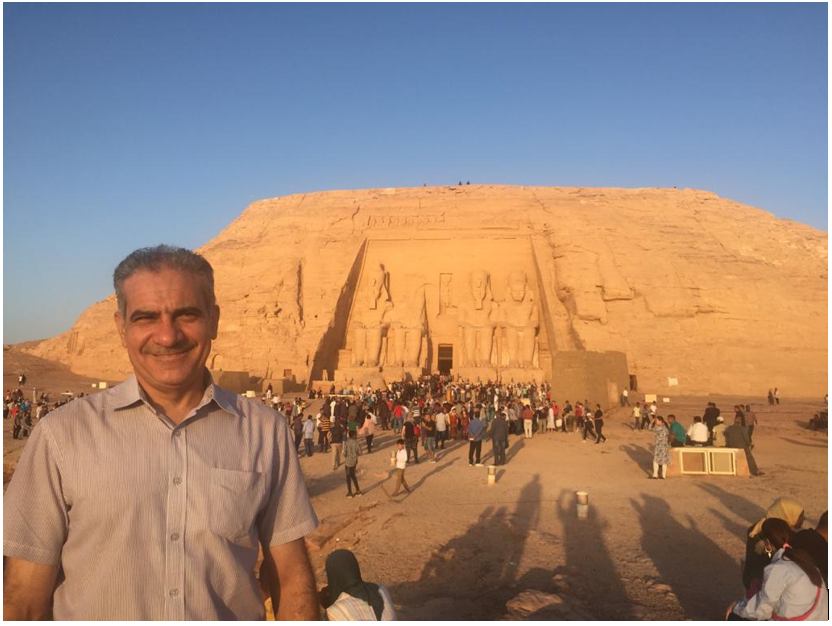
A picture of my father in front of Abu Simple temple the historical landmark of Aswan.
Aswan’s name came from the ancient times related to Sennett, who was the Egyptian goddess and Syene referring to the frontier town of ancient Egypt. Ancient Egyptian oriented themselves around the Nile River in the south as swenett was their southernmost in the county, which had advantage of navigating to the delta with no barriers through the Nile. Swenett was an important military station in the ancient Egyptian times.
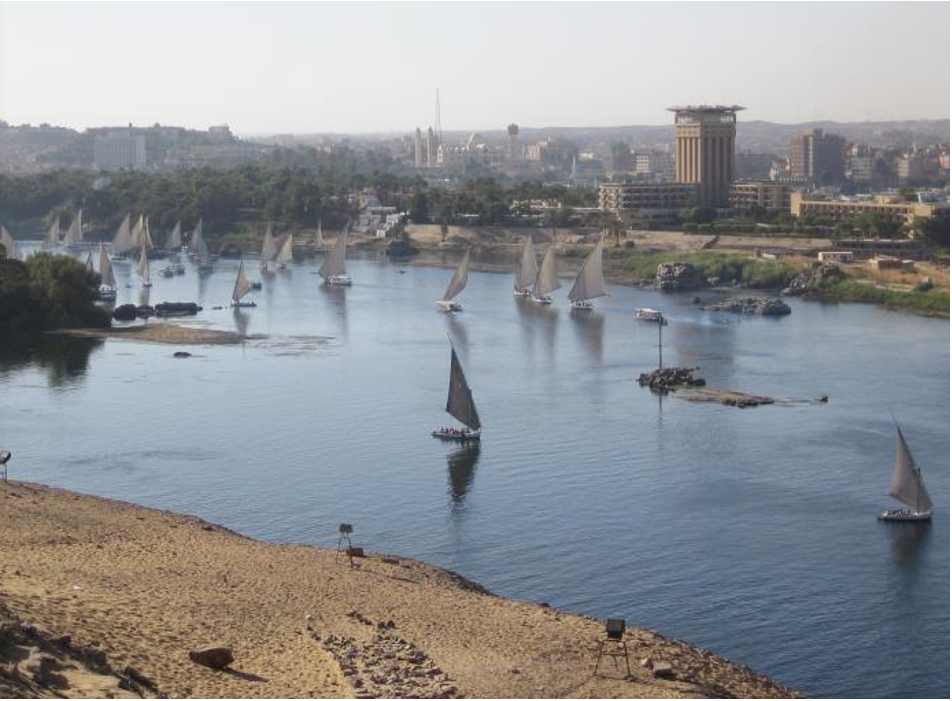
Source: https://en.wikipedia.org/wiki/Aswan
Nowadays modern Aswan is a tourism center with hotels and attraction sites spread along its Nile River. Also it is an industrial center with a copper and steel production complex, a chemical plant producing fertilizer, a cement plant, a sugar refinery, and quarries producing granite and marble. Aswan also includes many ancient temples that were built since 3000 BC.
Aswan has a hot desert climate, it is one of the hottest sunniest and driest cities in the world. During the summer weather temperatures are consistently above 25 °C and reaches above 40 °C in its hottest days. During the winter weather temperatures are remains around 24 °C and reaches 8 °C in its coldest days. Winter are brief and pleasantly mild, but can get cold at the nights. I recommend visiting Aswan at the winter as its weather would be warm and suitable for tourism.
Main tourism attractions that I have been to are Elephantine Island, Abu Simbel, Philae Temple, Nubian museum and The Aga Khan Mausoleum. So, let me introduce you to these attractions.
Elephantine Island
Elephantine Island is one of the Aswan major tourist attractions, decorated with palm trees and sloping villages with colorful brick houses, It includes Aswan museum that has a collection of artifacts that’s spans elephantine island’s history to the roman. Also it includes the most ancient settlement which contains the old kingdom temple of Khnum and temple of Satet.
The temple of Satet was built in 3200 BC and it was a dedication to the goddess Satet, personification of the Nile inundation. Temple of Khnum dedicated to the god of Khnum the god of creation, temple construction started during king Tuthmosis II during the 18th Dynasty but the temple completed construction during the Ptolemaic and the Roman period. Temple’s walls are carved with drawings showing Ptolemaic and Roman Emperors dressed in Pharaoh costumes, offering sacrifices to the god Khnum.
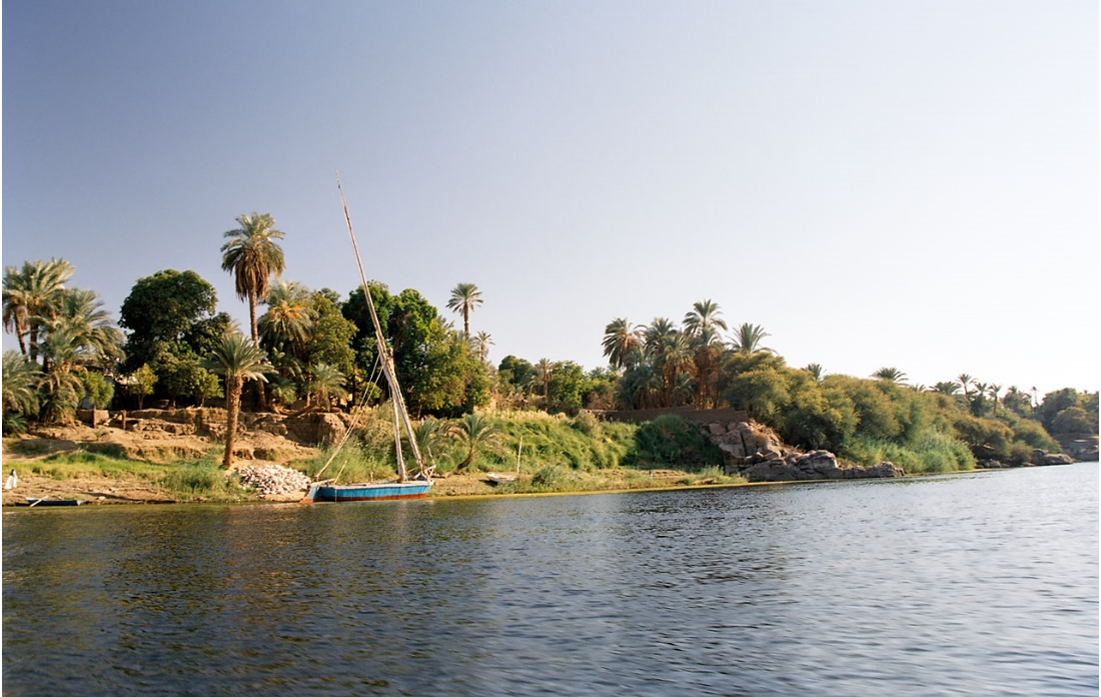
Source: https://en.wikipedia.org/wiki/Elephantine
One of the important ancient structures is Aswan’s Nilometer it’s located on the eastern Nile bank. It was used in the ancient Egyptians era to measure the Nile rise and fall, to calculate the height of the annual flood and predict the success of their harvest. While Nilometers originated in Pharaonic times, they continued to be used by the later civilizations such as the Roman civilization.
Abu Simbel
It was built by Ramses II, located at the bank of Lake Nasser. The temple consists of three consecutive halls extending 56 metres into the cliff. Three figures of Ramses with height of 20 meters are set on both sides of the temple entrance. Small figures of Ramses children, his queen, Nefertari, and his mother, Muttuy are carved around Ramses figure feet. The temple is a dedication to the sun gods Amon-re and Re Horakhte.
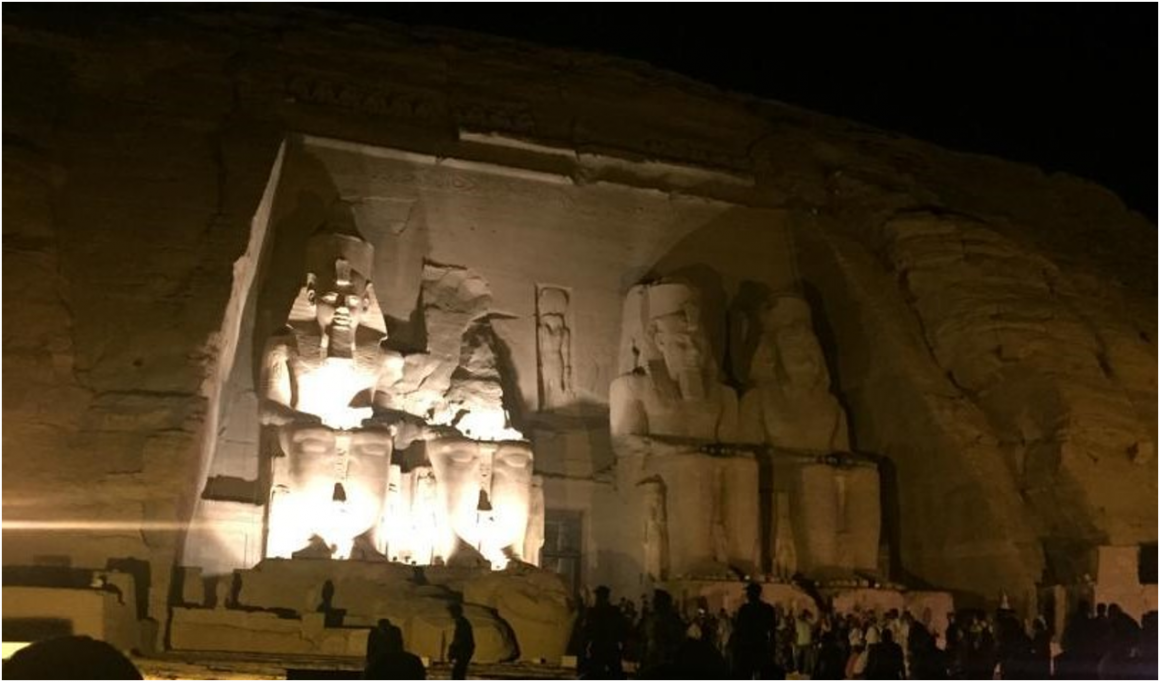
A picture I took at night for the Abu Simbel temple
On two days of the year (February 22 and October 22), the first rays of the morning sun penetrate the whole length of the temple and illuminate Ramses II statue. The first day (February 22) of sunlight alignment on the Ramses II’s face is marking his coronation, and the second day (October 22) of sunlight alignment is marking his birthday. Also the sunlight illuminate the statues sitting next to Ramses II who are the Re-Horakhte and Amon-Re both gods of the sun. The statues sit in the company is Theban the god of darkness Ptah, who remains in the shadows all year.
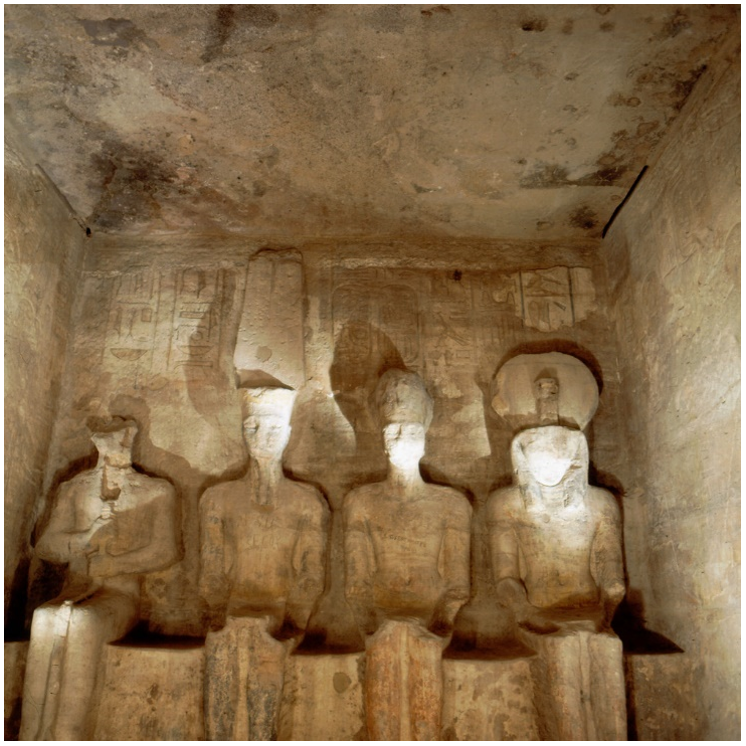
Source: A picture showing the sunlight illmuinating the statues inside the temple of Abu Simbel. https://en.wikipedia.org/wiki/Abu_Simbel
In the mid-20th, because of the construction of Aswan high dam, it threatened to submerge Abu Simbel temple. It was saved by a project to save the site by the Egyptian government cooperating with the UNESCO, the project was supported by funds from more than 50 countries. The temple was saved by disassembling the temple and reconstructing them on high grounds with the help of local workforce and international team of engineers and scientists. In 1979 Abu Simbel was designated a UNESCO world heritage site.
Philae Temple
Philae Temple which is known as Temple of Isis which is dedicated to Isis, Osiris, and Horus. Temples of Philae were venerated from the Pharaonic era through the Greek, Roman, and Byzantine periods with each ruler making their own additions to the temple. Temple of the goddess “Isis” was completed by the Ptolemy king II Philadelphus. Its walls contain scenes showing the Ancient Egyptian trinity consisted of Isis, Osiris and Horus. In those scenes, Isis is bringing life back to Osiris, giving birth to Horus, and mummifying Osiris after his death.
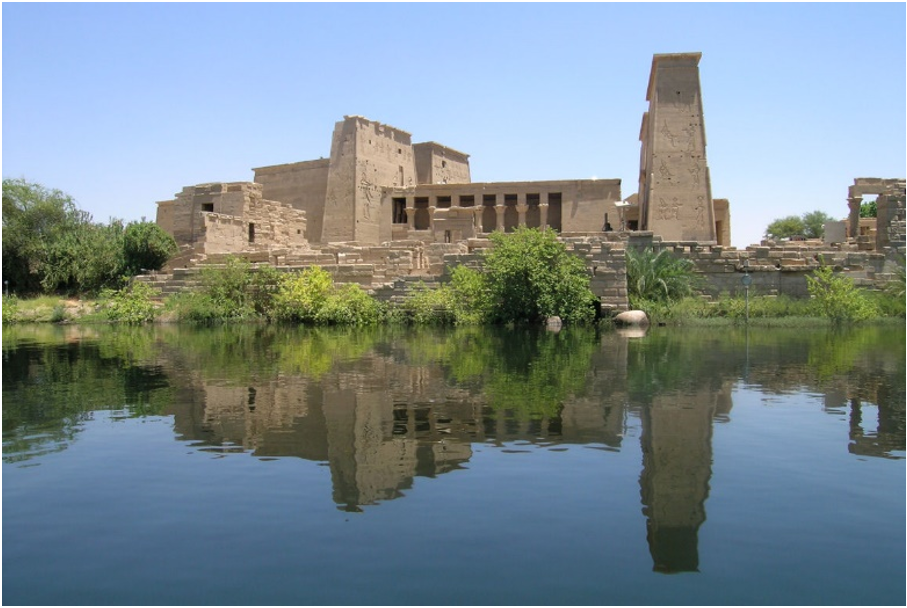
Source: https://en.wikipedia.org/wiki/Philae
Saved from a water flood by UNESCO's rescue project during the building of the Aswan High Dam, the temples were transferred block by block from their original place on Philae Island to another island called Agilika Island located in the south of Aswan.
Nubia
Nubians are the people who lived in the region which is known as Northern Sudan and Southern Egypt in the present day. Their origin are from early inhabitants of the center Nile valley, which are believed to be one of the earliest civilizations in humanity. They have their own language the Nubian language which is part of the Sudanic language.
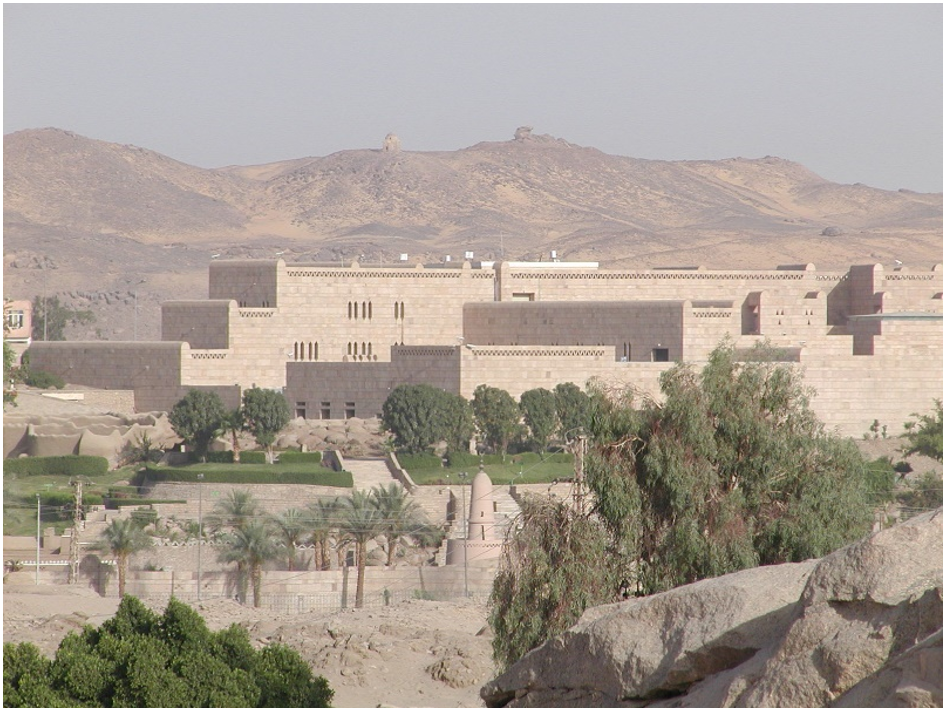
Source: https://en.wikipedia.org/wiki/Nubian_Museum
The construction of Aswan high dam threatened monuments of Nubia. Fortunately international campaign by the UNESCO and Egyptian government saved the Nubians monument in Nubia museum, showing case more than 3,000 objects found during excavation, museum serves as a center point for Nubian history and culture. Preserving and presenting the Nubia history to this day.
The Aga Khan Mausoleum
One of the places that witnessed a love story recorded in Aswan is the Aga Khan Mausoleum located in the bank of the Nile River, which many tourists visit it by a Nile cruise.
The 48th Imam of the Shia Ismaili Muslims, one of the founders of the All-India Muslim League and was the president of the League of Nations in 1937 is known as Aga Khan. He was the spiritual leader of Ismailis in India. Though the spiritual leader passed away in 1957. When Aga Khan knew that his time has come and leave this world, he decided to burial place and choose a location somewhere along the west bank of the Nile River.
After he passed away his wife Yvette Blanche Labrousse was the one who oversaw the construction of the Aga Khan Mausoleum structure. With the help of famous architects and contractors the project was finished in 16 months. The mausoleum is huge that it could be seen from as far away as the Nile.
The romantic story related to this place is that since Aga Khan’s death his wife continued to leave a red rose on his white marble tomb every day. She managed to do this faithfully until she passed away in 2000. Although by a request of her to her family a red rose still finds its way to Aga Khan’s white tomb.
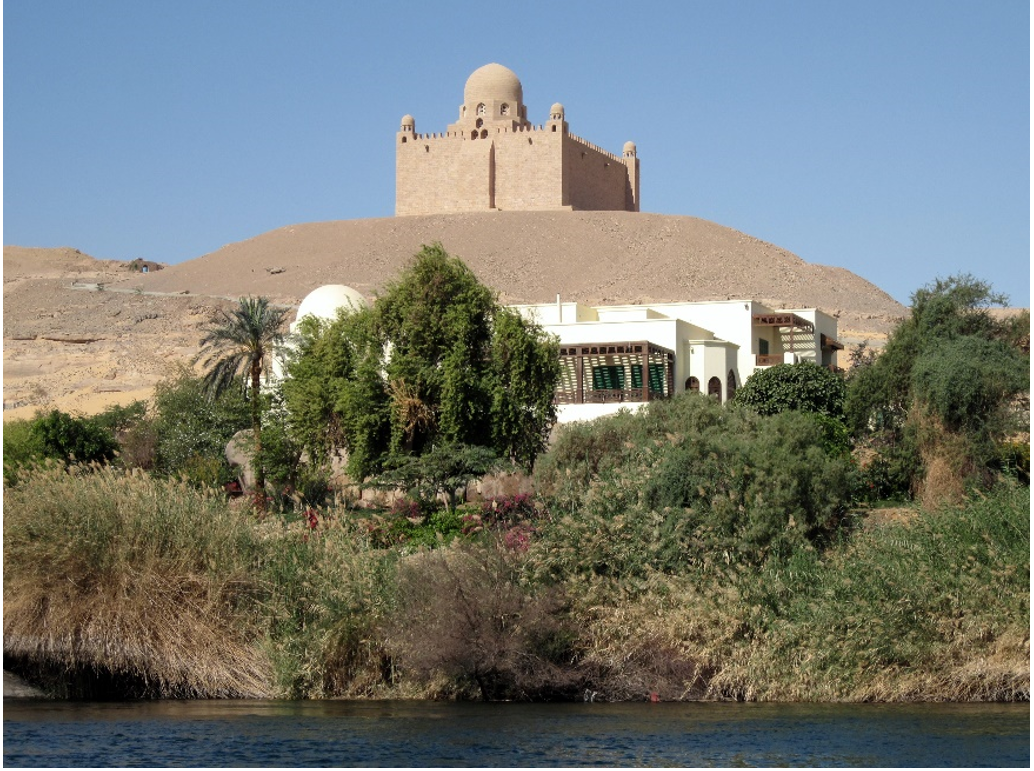
Source: https://en.wikipedia.org/wiki/Nubian_Museum
Actually, Aswan have more beautiful places that it is hard to cover it all here. Its warm weather in winter make it the finest place for winter vacation chosed specially by those who suffer the cold winter weather in their countries. Aswan is full of various hotels including luxurious ones witnessed historical events back to the niteenth century. Many celebreties chose Aswan for their weddings or honeymoon. Finally, I can personally admit that Aswan’s people are of the kindest people in the world. This was just a brief introduction about Aswan my favourite city in Egypt.
References:
https://www.britannica.com/place/Aswan-Egypt
https://www.egypttoursplus.com/aga-khan-mausoleum/
https://en.wikipedia.org/wiki/Aswan




